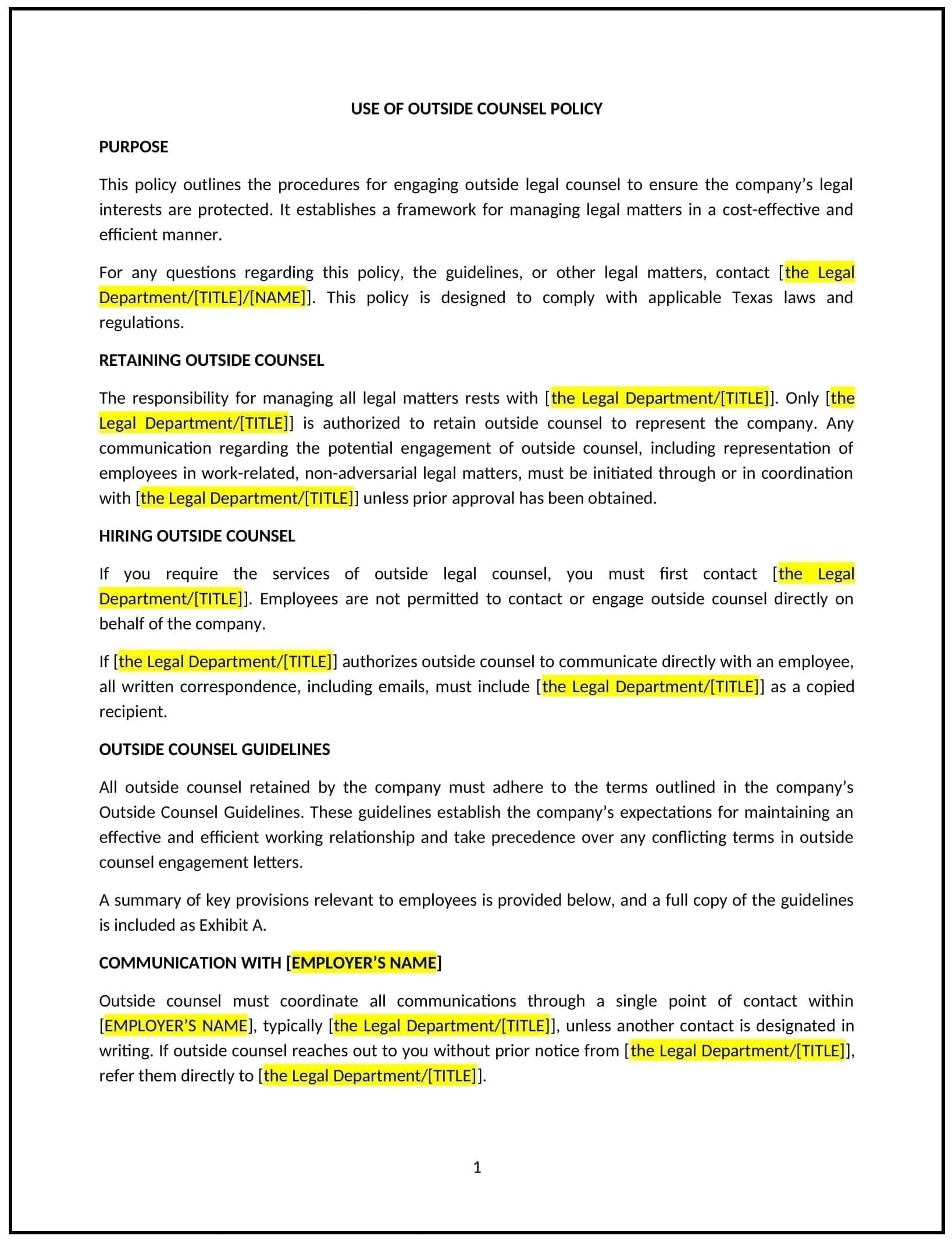Use of outside counsel policy (Texas): Free template
Got contracts to review? While you're here for policies, let Cobrief make contract review effortless—start your free review now.

Customize this template for free
Use of outside counsel policy (Texas)
This use of outside counsel policy is designed to help Texas businesses establish clear guidelines for when and how external legal services should be utilized. The policy outlines the process for engaging outside counsel, expectations for collaboration with in-house legal teams, and the circumstances under which outside counsel can be retained. It ensures that external legal services are used efficiently, cost-effectively, and in compliance with the company's legal and business needs.
By adopting this policy, businesses can ensure that outside counsel is engaged appropriately, manage legal costs, and maintain consistent and high-quality legal services.
How to use this use of outside counsel policy (Texas)
- Define when outside counsel should be used: Clearly specify the circumstances under which outside counsel can be engaged, such as for specialized legal expertise, litigation, regulatory matters, or when in-house resources are unavailable or overloaded.
- Set approval procedures: Outline the approval process for retaining outside counsel, including who must approve the engagement, the required documentation (e.g., a summary of the legal issue and scope of work), and any budget or cost limits.
- Establish budget and cost control measures: Define guidelines for managing the costs of outside counsel, including how budgets should be set and tracked. The policy should specify whether employees need to get approval before incurring additional fees or costs and how to report expenses.
- Outline collaboration expectations: Specify how outside counsel should collaborate with the in-house legal team, including communication protocols, reporting requirements, and the process for sharing information to ensure that all legal efforts are coordinated effectively.
- Set performance standards: Define the quality of service and timelines expected from outside counsel, and outline how the company will measure performance, including regular updates and progress reports.
- Address confidentiality and conflicts of interest: Ensure that outside counsel adheres to confidentiality requirements, particularly when dealing with sensitive business matters. The policy should require outside counsel to disclose any conflicts of interest and address them before proceeding.
- Outline termination procedures: Specify the process for terminating the engagement of outside counsel, including conditions under which the company may discontinue using their services and how the transition back to in-house counsel will be managed.
- Ensure compliance with laws and regulations: Ensure that all engagements with outside counsel are in compliance with Texas state laws, federal regulations, and ethical guidelines governing the legal profession.
Benefits of using this use of outside counsel policy (Texas)
This policy offers several benefits for Texas businesses:
- Controls legal costs: By setting guidelines for engaging outside counsel and establishing cost-control measures, businesses can avoid excessive legal fees and better manage their overall legal expenditures.
- Ensures consistent legal services: The policy promotes consistency by ensuring that outside counsel follows the same standards and procedures as in-house legal teams, leading to more coordinated and effective legal services.
- Protects company interests: The policy ensures that outside counsel is properly vetted and engaged for the right reasons, helping to protect the company’s legal interests and avoid unnecessary risks.
- Promotes efficiency: With clear processes for approval, engagement, and performance tracking, businesses can ensure that the use of outside counsel is efficient, timely, and aligned with business objectives.
- Reduces conflicts of interest: By addressing potential conflicts of interest upfront, businesses can reduce the risk of issues arising from legal representation that may be detrimental to the company.
- Enhances compliance and legal risk management: The policy ensures that all external legal services comply with applicable laws, regulations, and ethical standards, minimizing the risk of legal liabilities.
Tips for using this use of outside counsel policy (Texas)
- Communicate the policy clearly: Ensure that all employees who are responsible for engaging legal services are familiar with the policy, including the approval processes and cost control measures.
- Set clear expectations with outside counsel: Clearly communicate the company’s expectations regarding performance, timelines, and communication. Establish how often updates are required and set up regular check-ins to monitor progress.
- Review fees and budgets regularly: Regularly review the fees and billing statements from outside counsel to ensure they align with the agreed-upon budgets and that no unexpected costs are incurred.
- Foster a strong working relationship: Maintain open lines of communication with outside counsel and the in-house legal team to ensure that all legal efforts are aligned and working toward common goals.
- Document all engagements: Keep detailed records of all engagements with outside counsel, including agreements, approvals, communications, and performance assessments, to ensure proper oversight and compliance.
- Review and update the policy: Periodically review the policy to ensure it remains aligned with changes in Texas state laws, company practices, and industry standards. Adjust the policy as necessary to address evolving legal needs.